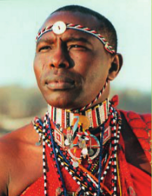Facing the Lion: Growing Up Maasai on the African Savanna
National Geographic Children’s Books 2003.
 Never before has a Maasai told about his childhood in the kind of detail Lemasolai did, and never before has a Maasai had a career path like Lemasolai: from cow herder in Kenya to Harvard University in the USA, and back to the Kenyan Parliament.
Never before has a Maasai told about his childhood in the kind of detail Lemasolai did, and never before has a Maasai had a career path like Lemasolai: from cow herder in Kenya to Harvard University in the USA, and back to the Kenyan Parliament.
Lekuton is a Maasai word for “the proud one,” and Lekuton was named that because as baby he refused to be nourished by the milk of his mother. Lekuton grew up in Kenya’s highland, the vast grasslands on foot of Mount Kenya, where the people of the Maasai herd their cows. The life of the Maasai centers around the raising and grazing of cattle. Every cow is given a name; the cows are the much cherished wealth of the clans and families.
Lekuton was herding cows and climbing trees before he entered a missionary boarding school. By a stroke of fate, he was able to attend the local mission school. He found that he liked education, and eventually he dedicated his life to reconciling these two different lifestyles. Lekuton’s first encounter with a lion, the epitome of bravery in the warrior tradition, became the turning point in his life. He looked into the eyes of the lion, but was too young to cope with the challenge. What would have been a disaster in the life of a normal young Maasai boy became for Lemasolai the challenge of his life. “Facing the Lion” became the metaphor for all the other tests in his life, and in fact for his life itself.
His account also offers many details of Maasai life. Some examples include the pinching man who keeps the children in line, the way cows are cared for and valued, and the roles of men and women in society.Between the lines, you also get a glimpse of the religions and myths of the Maasai, one of the proudest peoples in Africa South of Sahara. And in addition to everything else, soccer played a decisive role in Lekuton’s career, thanks to former President of Kenya Daniel Arap Moi.
Novels and Autobiographies
African Traditional Life
Amkoullel, A Fula Child
Autobiographies
Aké. The Years of Childhood
Dreams in a Time of War
Facing the Lion: Growing Up Maasai on the African Savanna
Long Walk to Freedom
My Story
Unbowed: A Memoir
Coming of Age
Mandela’s Ego
Miriam's Song
Nervous Conditions
Purple Hibiscus
The Mending Season
Emigration
Lessons in Humanity
A Long Way Gone. Memoirs of a boy soldier
Child Soldier: Fighting for my life
I die, but my Memory lives on
Praise Song
Sozaboy
Stories about Friendship



